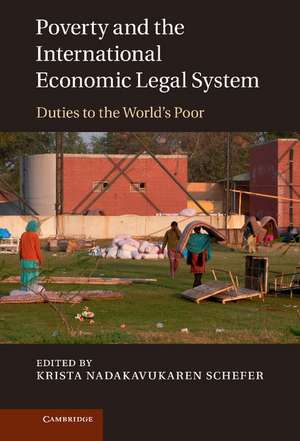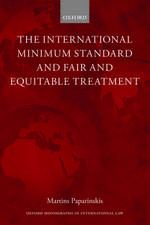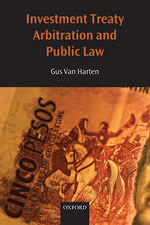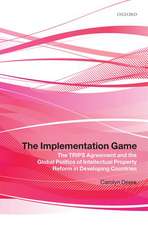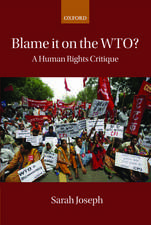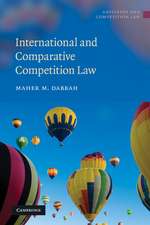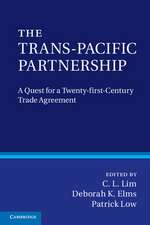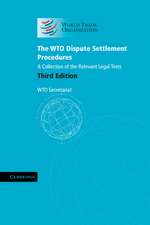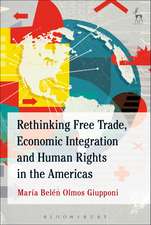Poverty and the International Economic Legal System: Duties to the World's Poor
Editat de Krista Nadakavukaren Scheferen Limba Engleză Hardback – 20 mar 2013
Preț: 902.33 lei
Preț vechi: 1049.21 lei
-14% Nou
Puncte Express: 1353
Preț estimativ în valută:
172.66€ • 180.73$ • 143.71£
172.66€ • 180.73$ • 143.71£
Carte tipărită la comandă
Livrare economică 31 martie-14 aprilie
Preluare comenzi: 021 569.72.76
Specificații
ISBN-13: 9781107032743
ISBN-10: 1107032741
Pagini: 500
Ilustrații: 1 b/w illus.
Dimensiuni: 150 x 231 x 30 mm
Greutate: 0.95 kg
Ediția:New.
Editura: Cambridge University Press
Colecția Cambridge University Press
Locul publicării:New York, United States
ISBN-10: 1107032741
Pagini: 500
Ilustrații: 1 b/w illus.
Dimensiuni: 150 x 231 x 30 mm
Greutate: 0.95 kg
Ediția:New.
Editura: Cambridge University Press
Colecția Cambridge University Press
Locul publicării:New York, United States
Cuprins
Part I. Poverty and International Law: Setting out the Framework: 1. Poverty, obligations and the international economic legal system: what are our duties to the global poor? Krista Nadakavukaren Schefer; 2. Anti-poverty v. the international economic legal order? A legal cultural critique Colin B. Picker; Part II. IEL Institutions and Poverty: Part IIA. Trade: 3. Introductory note: trade and poverty Gabrielle Marceau; 4. Poverty, redistribution and international trade regulation Thomas Cottier; 5. Trade liberalisation and poverty reduction: complementary or contradictory aims? Bryan Mercurio; 6. God, the WTO and hunger Christian Häberli; 7. Does free trade matter for poverty reduction? The case of ASEAN Pasha Hsieh; 8. Poverty alleviation through paperless trade Emmanuel Laryea; Part IIB. Investment and Arbitration: 9. Arbitration, insurance, investment, corruption, and poverty: introduction J. J. Gass; 10. Foreign direct investment and the alleviation of poverty: is investment arbitration falling short of its goals? Mariel Dimsey; 11. The 'corruption objection' to jurisdiction in investment arbitration: does it really protect the poor? Stephan Wilske and Willa Obel; 12. Investment guarantees and international obligations to reduce poverty: a human rights perspective Markus Krajewski; 13. International commercial arbitration and poverty: not obvious but (maybe) possible Christopher Kee; 14. Access to justice in dispute resolution: financial assistance in international arbitration Brooks W. Daly and Sarah Melikian; 15. From problem to potential: the need to go beyond investor-state disputes and integrate civil society, investors and state at the local level Mariana Hernandez Crespo; 16. The Millennium Challenge Corporation, law, and poverty reduction Stuart Kerr; Part IIC. International Financial Regulation: 17. Reflections on law and poverty Gavin Bingham; 18. Ambitious goals, limited tools? The IMF and poverty reduction Ben Thirkell-White; 19. The direct contribution of the international financial system to global poverty Ross P. Buckley; 20. The World Bank: fighting poverty: ideology versus accountability Mark S. Ellis; 21. Life, debt and human rights: contextualising the international regime for sovereign debt relief Celine Tan; 22. Sovereign debt, odious debt and the poverty of nations Yvonne Wong; 23. Poverty and corruption Mark Pieth; Part III. IEL and Poverty: Concerns of Particularly Vulnerable Populations: 24. International economic law, women and poverty Barnali Choudhury; 25. The book famine: international copyright rules as barriers to knowledge for impoverished persons with disabilities Caroline Hess-Klein; 26. Caring for its children!: How the European Union uses free movement law to tackle child poverty and social exclusion Aline Doussin; Part IV. Challenging Our Assumptions: Is there a Duty to Reduce Poverty?: 27. Introduction Stephanie B. Leinhardt and Krista Nadakavukaren Schefer; 28. Human rights obligations of the poor Monica Hakimi; 29. The allocation of anti-poverty rights duties: our rights, but whose duties? Samantha Besson; Part V. Conclusions: 30. Closing thoughts Krista Nadakavukaren Schefer.
Recenzii
'This important book demonstrates that, at the very least, there are difficulties remaining from a legal - and, of course, practical - standpoint in using a human rights framework to establish international or extraterritorial state duties for the world's poor … [it is] a valuable read on a number of levels, encompassing a variety of content, which should encourage further research not only in relation to extending human rights doctrine on a transnational basis but also in relation to the development and use of other legal mechanisms to alleviate poverty.' Elaine Kellman, Global Law Books (www.globallawbooks.org/home.asp)
Descriere
Looking beyond development, this volume examines international trade, investment and finance law with a focus on poverty.
